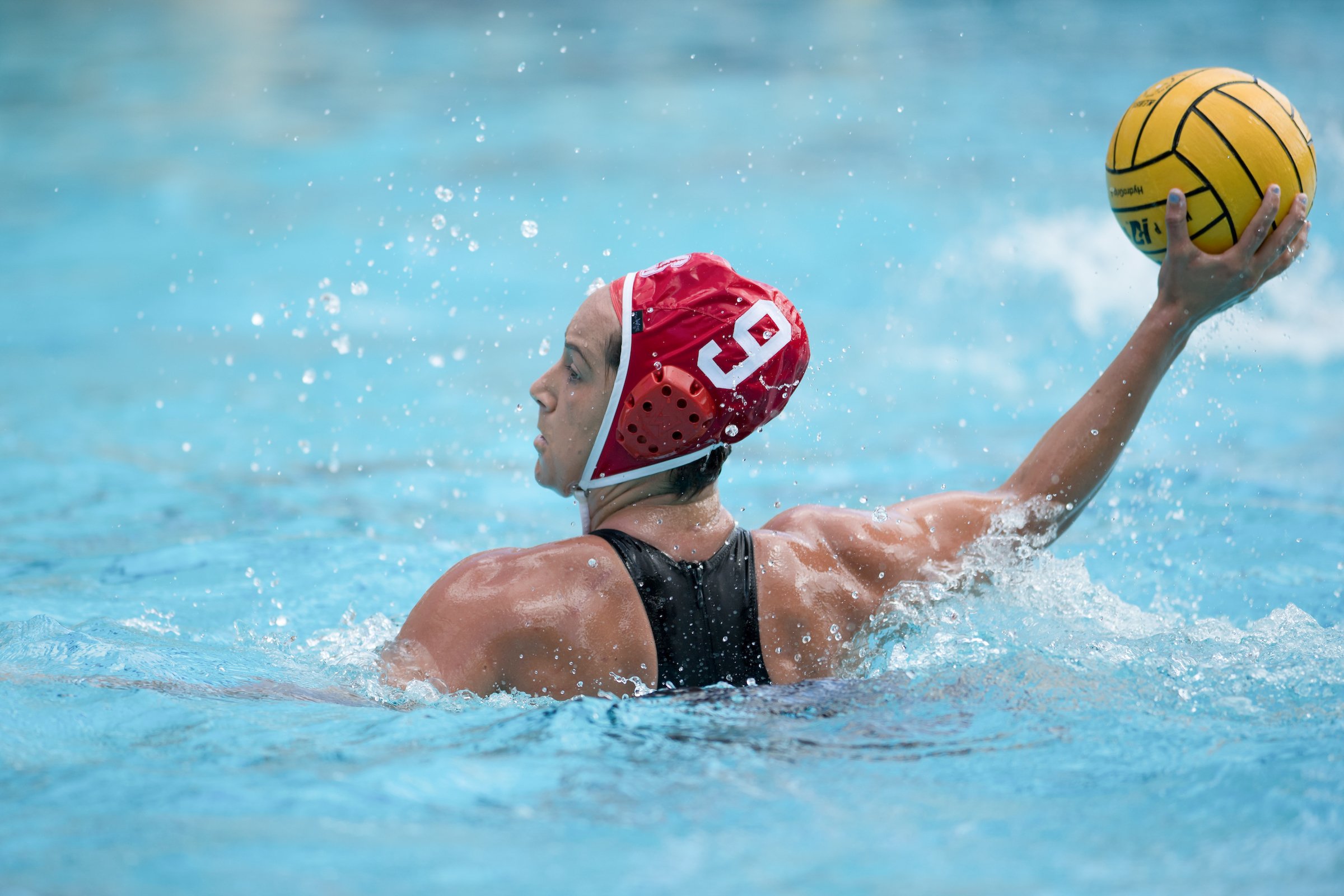Huddled around the pool deck in Indianapolis, the Stanford women’s water polo team looked calm and professional, imagining what it would be like to make history. That day was more than just a chance at a national championship for Stanford — a win would put Stanford at 113 NCAA titles, tied for first all-time with UCLA.
“Stanford always talks about leaving a legacy— it’s a motto of our school,” explained senior captain Maggie Steffens. “We decided to flip that a little bit, and say its time to live our legacy. Live it out, right here in this pool, where Stanford swimming had already left their legacy.”
The women underneath the white Stanford water polo caps spanned seven age classes — from sixth-year seniors to freshmen. Steffens, for example, was returning as a sixth-year senior after taking years off for the 2012 and 2016 Olympic Games. Despite the wide range of experience on the team, everyone chipped in the huddle before the game with words of encouragement and strategy.
“It was our time, our opportunity to leave the Stanford name as a historical part of that pool,” recalls Steffens about the team talking before the game. “We said, ‘Why shouldn’t it be women’s water polo to tie the NCAA record with 113 wins with UCLA?’ We were going to go out there, have fun. Do it for our legacy, do it for each other, and do it for our school.”
The weekend hadn’t been easy for Stanford to that point. The Cardinal cruised to a 13-6 victory over Pacific on Friday, only to narrowly battle out an 11-10 victory on Saturday against USC. The Trojans and the Cardinal swam neck-and-neck up until the final 30 seconds, when Stanford forced a shot clock violation after a USC timeout.
Yet, Stanford led the action early in the first half of the final on Sunday. Thanks to combination plays from players like Madison Berggren, Jordan Raney, Jamie Neushul and Steffens, Stanford entered the second half with a 5-2 lead.
However, even with a three-point advantage at halftime, the Cardinal women knew not to get ahead of themselves.
“The mood at halftime was to try and get the next stop, get the next goal,” Steffens said. “We were really trying to focus on doing one thing at a time, because we had been down the previous day, and so we knew that in any given moment, the game could be tied.”
A hat trick from UCLA’s Alys Williams began complicating things for Stanford in the third quarter. The Bruins closed the gap to 7-5 going in to the fourth quarter.
With 51 seconds remaining in the final period, UCLA tied the game for the first time at 7-7. Stanford turned the ball over with 30 seconds on the clock, and the Bruins called timeout to set up for the game’s final shot.
“There was 150 percent buy-in to what we were doing,” Steffens said. “Even when we were down, facing adversity, we could look into each other’s eyes and be calm and know we could get it done. That’s something that’s really hard to create, really hard to find. That’s ultimately what helped us win the finals — simply looking into each other’s eyes and knowing we could do it.”
Over on the sidelines, head coach John Tanner was left to admire his team’s composure.
“They’re really resilient this weekend, dedicated to our game plan,” he said. “They played with a lot of discipline. When things get difficult, they were at their best.”
When play resumed, Steffens managed to intercept a Bruins pass on the outside, regaining Cardinal possession. With nine seconds left, Berggren threaded the ball to Steffens at the 5-meter mark. With a net-rattling shot to the top of the cage, Steffens clinched the national championship for Stanford, her final contribution to the Cardinal women’s legacy.
“It all kind of hits you at once — once the buzzer goes,” Tanner said with a smile.
The Cardinal coaches, players and assistants jumped into the pool, celebrating Stanford’s fourth NCAA title in the past six months — the most in a single year since 2001-02. By breaking the fourth-quarter tie against UCLA, Stanford women’s water polo created a new tie — a tie between the two universities for the most NCAA titles of all time.
“It’s hard, because Stanford has a culture, right?” Steffens said after the game. “It has a culture of excellence, a culture of drive to always want to be the best — whether it’s in the classroom, in your sport or in other aspects of your life. In that sense, we’ve really carried on the tradition of that culture — the legacy of Stanford women’s water polo.”
Steffens’ own role in perpetuating that legacy of success cannot be understated. Apart from her role in the finals — tournament MVP and three hat tricks on the weekend — she is a team captain, offensive powerhouse and role model outside of the pool.
“I’ve known her since she was 10,” Tanner said. “Maggie’s always been charismatic, energetic, enthusiastic, eternally optimistic and incredibly skillful and passionate about competition. All those things combine to make her the best leader I’ve ever been around.”
The conclusion of the 2017 season also comes with the conclusion of captain Maggie Steffens’ time at Stanford. Even for the two-time Olympic gold medalist and MVP, Steffens’ final game with her Stanford team was particularly evocative, a memory she says she will cherish forever.
“I just want to be remembered at Stanford simply as someone who lived out the Stanford tradition, and if anything, pushed the people around me to be better,” she said. “All so that the Stanford legacy could be bigger and better than it has been. Truly, that’s what its about — it’s about making Stanford great.
“I’m truly grateful for the opportunity to represent the Stanford ‘S.’”
Contact Kit Ramgopal at kramgopa ‘at’ stanford.edu.
